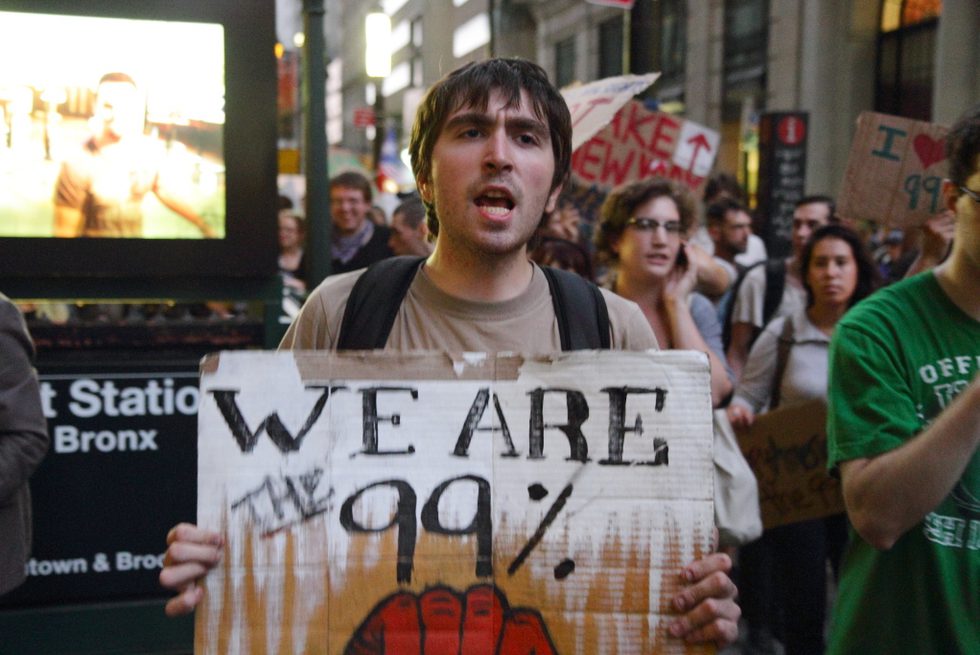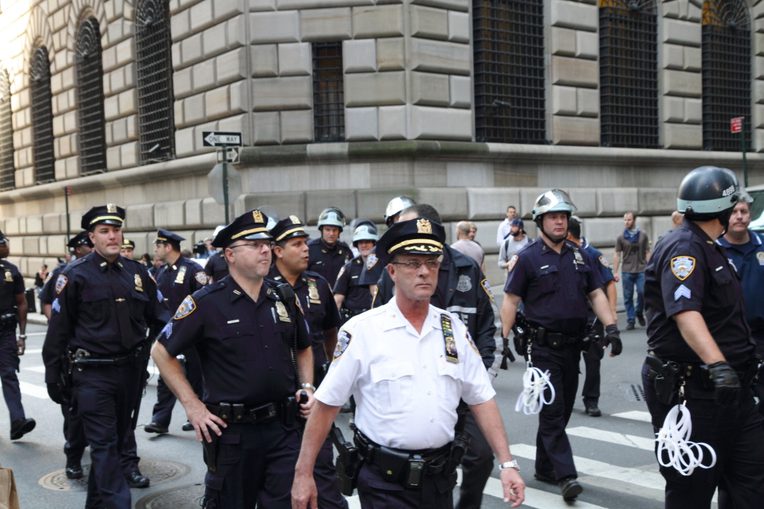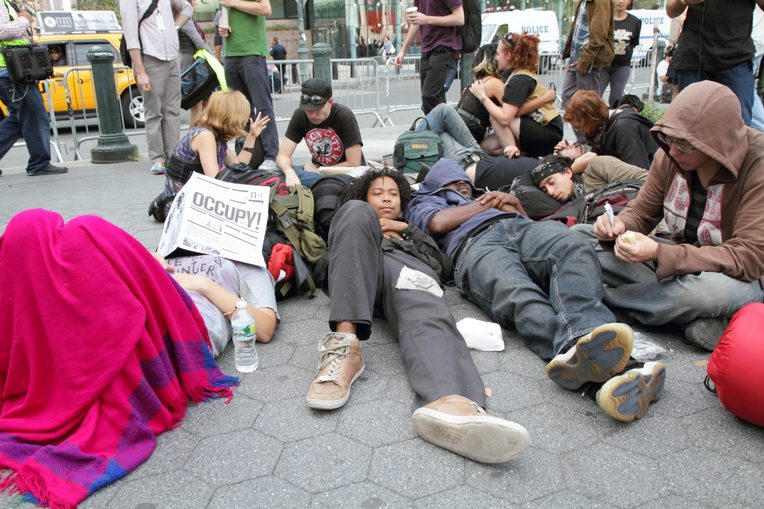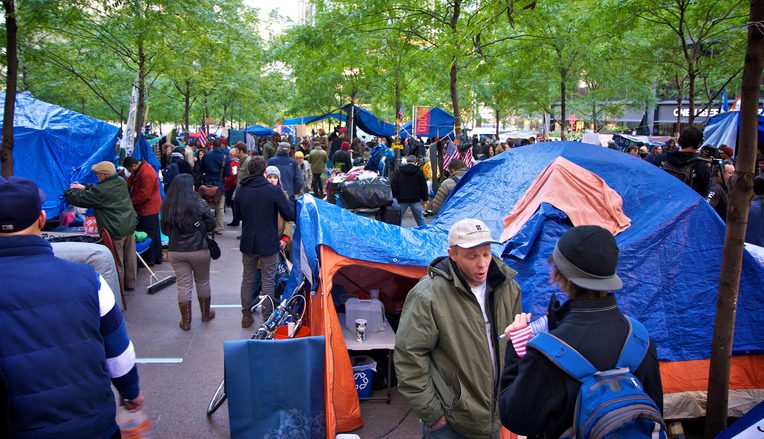
Overview of Theme
Adapted from the Introduction to “Hot Spots: Occupy, Anthropology and the 2011 Global Uprisings”, guest edited by Jeffrey S. Juris (Northeastern University) and Maple Razsa (Colby College)
Occupy Wall Street burst spectacularly onto the scene with the take-over of New York City's Zuccotti Park on September 17, 2011, followed by the rapid spread of occupations to cities throughout the US and the world. The movement combined mass occupations of urban public spaces with horizontal forms of organization and large-scale, directly democratic assemblies. Making effective use of the viral flows of images and information generated by the intersections of social and mass media, the occupations mobilized tens of thousands around the globe, including many new activists who had never taken part in a mass movement before, and inspired many more beyond the physical encampments themselves. Before the wave of violent police evictions in November and December of 2011 drove activists into submerged forms of organizing through the winter, the Occupy movements had already captured the public imagination. Bequeathing to us potent new memes such as the 1% (those at the top of the wealth and income scale) and the 99% (the rest of us), Occupy provided a framework for talking about issues that have been long obscured in public life such as class and socio-economic inequality and helped to shift the dominant political-economic discourse from an obsession with budget deficits and austerity to a countervailing concern for jobs, equality, and economic fairness.
Learning Outcomes
After this lesson, students will:
1) Have a general understanding of the origins and philosophy behind the Occupy movement
2) Know relevant dates and events that have marked its history
3) Be able to place the movement within the current global social and political situation, and in relation to other contemporary social movements
Audience
- Undergraduate students in Anthropology, Sociology, Political Sciences
- Faculty teaching seminars on social movements
Readings
Academic Journals/Forums
Juris, Jeffrey. “Reflections on #Occupy Everywhere: Social Media, Public Space, and Emerging Logics of Aggregation”. American Ethnologist 39.2 (2012): 259-279.
Nugent, David. "Commentary: Democracy, temporalities of capitalism, and dilemmas of inclusion in Occupy movements". American Ethnologist 39.2 (2012): 280-283.
"Occupy Movement." Possible Futures: A Project of the SSRC
Dole, Christopher. “Revolution, Occupation, and Love: The 2011 Year in Cultural Anthropology”. American Anthropologist 114.2 (2012): 227-239.
“Imperialism, Finance, #Occupy 2012.” Journal of Critical Globalization Studies. 2012 ***Free Access***
Kazam, Azza. “Reclaiming Dignity: Arab Revolutions of 2011.” Anthropology News 52.5 (2011): 19.
Razsa, Maple and Kurnik, Andrej. "The Occupy Movement in Žižek's hometown: Direct democracy and a politics of becoming". American Ethnologist 39. 2 (2012): 238–258.
Selected Essays
"The Fight for 'Real Democracy' at the Heart of Occupy Wall Street" by Michael Hardt and Antonio Negri. Foreign Affairs, 2011.
"Occupy Wall Street and the Politics of Representation" by Jodi Dean and Jason Jones. Chto Delat, 2012.
"Occupy Wall Street: Lessons from anti-globalization protests" by Naomi Klein. Rabble.ca, 2011.
"Occupy Wall Street: what is to be done next?" by Slavoj Žižek. The Guardian, 2012.
"Occupy first. Demands come later" by Slavoj Žižek. The Guardian, 2011.
“To Camp or Not to Camp, that is Occupy’s Question” By Michele Fauwcett and Arun Gupta. Salon, 2012.
“The Public Sphere of Occupy Wall Street” By Adam Fish. Savage Minds, 2011.
“Occupy Wall Street’s Anarchist Roots” By David Graeber. Aljazeera, 2011.
"Pre-Occupy" By Annie McClanahan. Centre for 21st Century Studies, 2012.
“On the People’s Mic: Politics in a post-literate age” By Ryan Ruby. Journal for Occupied Studies, 2012.
“Occupy Wall Street’s Free Speech Appeal” By Nathan Schneider. Harper's, 2012.
“Thank You, Anarchists” By Nathan Schneider. The Nation, 2011.
“They are not Afraid” Jeremy Varon. Journal for Occupied Studies, 2012.
"Concerning the Violent Peace-Police" By David Graeber. n+1, 2012.
Books/Collections
Occupy!: Scences from Occupied America (Edited by Carla Blumenkranz, Keith Gessen, Mark Greif, Sarah Leonard, Sarah Resnick, Nikil Saval, Eli Schmitt, and Astra Taylor). Brooklyn: Verso, 2011.
Chomsky, Noam. Occupy (Occupied Media Pamphlet Series). Brooklyn: Zuccotti Park Press, 2012.
The Occupy Handbook. Janet Byrne (ed.). New York: Back Bay Books, 2012.
This Changes Everything: Occupy Wall Street and the 99% Movement. Sarah van Gelder and staff of Yes! Magazine (eds). San Francisco: Berrett-Koehler Publishers, 2012.
Gitlin, Todd. Occupy Nation: The Roots, the Spirit, and the Promise of Occupy Wall Street. New York: It Books, 2012.
Occupying Wall Street: The Inside Story of an Action that Changed America. Writers for the 99%, A.J. Bauer, Christine Baumgarthuber, Jed Bickman, Jeremy Breecher (eds.). Chicago: Haymarket Books, 2012.
Pre-class assignments
1) An assigned reading from the above lists
2) View one or more videos (see below, Multimedia Content)
3) Bring to class five images that represent the occupy movement
Opening activities
1) Free write (choose one or more of the following question
- What are the most pressing social issues of our time?
- How do social movements support or leverage citizen rights?
- When the Occupy movement was at its height (fall 2011) what were you hearing about the movement? What did you think of the movement?
- What does the Occupy movement oppose? What does it propose?
2) Share and discuss the images you brought to class. Where did you get them from? Are they creative commons images or from corporate news? How do the images portray the movement, activists, and issues?
In-class discussion questions
1) Why is the act of occupying is central to the movement?
2) What are the similarities and differences between Occupy and other social movements such as the Arab Spring, the Indignados in Spain, and protest movements in Greece? How do these movements relate to each other?
3) Has the Occupy movement been “successful”?
In-class activities
Hold a General Assembly in class, and raise different issues that affect all students (for example, who will make the next presentation, how you are going to divide tasks for this class throughout the term, or what new campaign issue you are going to raise before the students' union). Students will be asked to reach decisions by consensus, thus emulating the decision making process that Occupy (and other contemporary movements) have adopted, and understanding how it develops.
Images
Discuss these images and the ways in which they represent the Occupy Movement and its messages.




Multimedia content: Videos
The following videos intend to provide an insight into the history, processes, and philosophy behind the Occupy Movement:
Websites
New York City General Assembly
Global Revolution - Live Streaming
Occupy Movement Research Guide
Closing activity
Discuss: How would you have participated in the Occupy movement? What could the Occupy movement have done differently? How could politicians, Wall Street, and the media have responded differently?